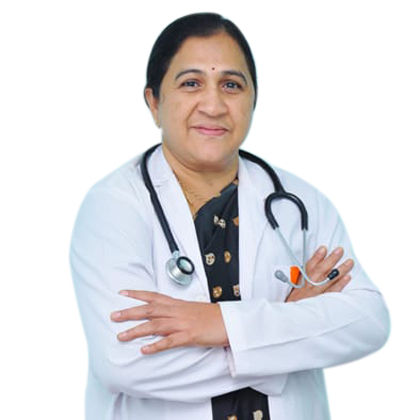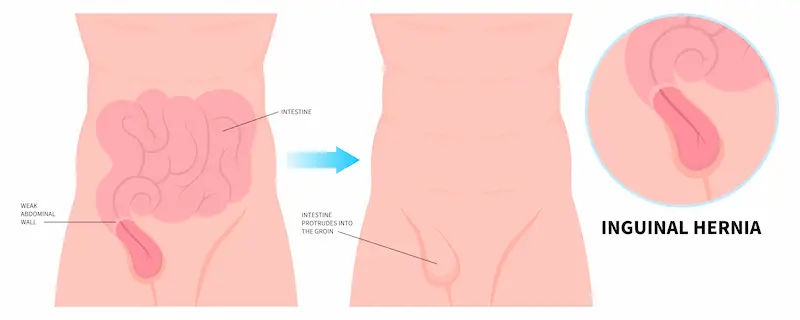Umbilical Hernia Overview and Information
Learn about umbilical hernia, its causes, symptoms, and treatment options. Understand how this condition develops and the approaches available for effective management.

Written by Dr. Rohinipriyanka Pondugula
Reviewed by Dr. J T Hema Pratima MBBS
Last updated on 2nd Sep, 2025
.webp?tr=q-80,f-webp,w-350,dpr-2,c-at_max 700w)
An umbilical hernia is a common condition that occurs when part of the intestine or fatty tissue pushes through a weak spot in the abdominal muscles near the belly button (navel). While it can affect people of all ages, it is most commonly seen in infants and pregnant women. The good news is that most umbilical hernias are harmless and often resolve on their own, especially in babies. However, in some cases, medical attention may be needed.
In this article, we’ll discuss what an umbilical hernia is, its symptoms, causes, risk factors, and how it can be managed or treated.
What is an Umbilical Hernia?
An umbilical hernia happens when a small part of the intestine or abdominal tissue bulges out through an opening in the abdominal muscles near the navel. This creates a soft lump or swelling that may become more noticeable when coughing, crying (in babies), or straining during bowel movements.
Who Gets Umbilical Hernias?
- Infants – Common in newborns, especially premature babies.
- Pregnant Women – Increased abdominal pressure can lead to hernias.
- Adults with Obesity – Excess weight puts strain on the abdominal wall.
- People with Chronic Cough or Heavy Lifting – Repeated strain can weaken muscles.
Consult a Top Gynecologist
Symptoms of an Umbilical Hernia
Most umbilical hernias are painless and may only show a visible bulge. However, some signs to watch for include:
- A soft swelling or lump near the belly button (more noticeable when standing or straining).
- Discomfort or mild pain around the navel (especially when coughing or lifting heavy objects).
- Redness, tenderness, or vomiting (rare, but may indicate a serious complication).
Note: In infants, the hernia may become more prominent when the baby cries but usually goes away when they relax.
Causes and Risk Factors
Below are few causes and risk factors,
Common Causes:
- Weak Abdominal Muscles – Some people are born with a small gap in their abdominal muscles near the navel.
- Increased Abdominal Pressure – Pregnancy, obesity, chronic coughing, or heavy lifting can contribute.
Risk Factors:
- Premature Birth – Babies born early have weaker abdominal muscles.
- Obesity – Excess weight increases pressure on the abdomen.
- Multiple Pregnancies – Repeated pregnancies may stretch abdominal muscles.
- Fluid in the Abdomen (Ascites) – Can increase pressure and cause hernias.
When to See a Doctor?
Most umbilical hernias in babies close on their own by age 1-2. However, medical attention is needed if:
- The hernia becomes painful, swollen, or discolored.
- The bulge doesn’t go away when lying down.
- There is vomiting, constipation, or severe pain (signs of a strangulated hernia, which is a medical emergency).
For adults, surgery may be recommended if the hernia is large, painful, or doesn’t improve with lifestyle changes.
Diagnosis and Treatment
Below is the diagnosis and treatment of this condition,
Diagnosis:
A doctor can usually diagnose an umbilical hernia through a physical exam. In some cases, an ultrasound or CT scan may be needed to check for complications.
Treatment Options:
1. Watchful Waiting (for Babies) – Most infant hernias close on their own by age 1-2.
2. Surgery (Herniorrhaphy) – Recommended if:
The hernia doesn’t close by age 4-5 (in children).
It causes pain or complications in adults.
3. Lifestyle Changes (for Adults) – Managing weight, avoiding heavy lifting, and treating chronic cough can help.
Prevention and Self-Care Tips
While some umbilical hernias can’t be prevented, these steps may help reduce risk:
- Maintain a Healthy Weight – Reduces pressure on the abdomen.
- Avoid Heavy Lifting – Use proper techniques if lifting is necessary.
- Treat Chronic Cough – Conditions like asthma or smoking-related cough should be managed.
- Strengthen Core Muscles – Gentle exercises (after consulting a doctor) may help.
When to Consider Surgery?
Surgery is usually simple and involves pushing the bulging tissue back and stitching the muscle closed. Recovery is quick, with most people resuming normal activities within a few weeks.
Why Choose Apollo 24|7 for Hernia Care?
If you or your child has an umbilical hernia, consulting a specialist is important. At Apollo 24|7, you can:
- Book a consultation with expert surgeons.
- Get a diagnosis through quick and reliable tests.
- Access safe and effective treatment options.
Final Thoughts
Umbilical hernias are common and usually harmless, but knowing when to seek medical help is crucial. Most babies outgrow them, while adults may need lifestyle changes or minor surgery. If you notice persistent swelling, pain, or other concerning symptoms, don’t hesitate to consult a doctor.
Consult a Top Gynecologist
Consult a Top Gynecologist

Dr. Parul Sharma
Obstetrician and Gynaecologist
8 Years • MBBS, MS (Obstetrics & Gynaecology)
New Delhi
THE DOCTORS NESST, New Delhi
Dr. K Anusha
Obstetrician and Gynaecologist
4 Years • MBBS, DGO
Yemmiganur
SRINIVASAA HOSPITAL, Yemmiganur

Dr. Asha Rani Singh
Obstetrician and Gynaecologist
24 Years • MBBS DGO
Delhi
Dr Asha Rani Singh Clinic, Delhi

Dr. Shyamala Devi
Obstetrician and Gynaecologist
38 Years • MBBS, MS Obstetrics & Gynaecology
Vijayawada
Sri Shivshakti Nilayam, Vijayawada

Dr. Sridevi Matta
Obstetrician and Gynaecologist
28 Years • MS ( OBG ), DGO, DNB Obstetrics & Gynaecology
Chinagadila
Apollo Hospitals Health City Unit, Chinagadila
(175+ Patients)
Consult a Top Gynecologist

Dr. Parul Sharma
Obstetrician and Gynaecologist
8 Years • MBBS, MS (Obstetrics & Gynaecology)
New Delhi
THE DOCTORS NESST, New Delhi
Dr. K Anusha
Obstetrician and Gynaecologist
4 Years • MBBS, DGO
Yemmiganur
SRINIVASAA HOSPITAL, Yemmiganur

Dr. Asha Rani Singh
Obstetrician and Gynaecologist
24 Years • MBBS DGO
Delhi
Dr Asha Rani Singh Clinic, Delhi

Dr. Shyamala Devi
Obstetrician and Gynaecologist
38 Years • MBBS, MS Obstetrics & Gynaecology
Vijayawada
Sri Shivshakti Nilayam, Vijayawada

Dr. Sridevi Matta
Obstetrician and Gynaecologist
28 Years • MS ( OBG ), DGO, DNB Obstetrics & Gynaecology
Chinagadila
Apollo Hospitals Health City Unit, Chinagadila
(175+ Patients)
.webp)



